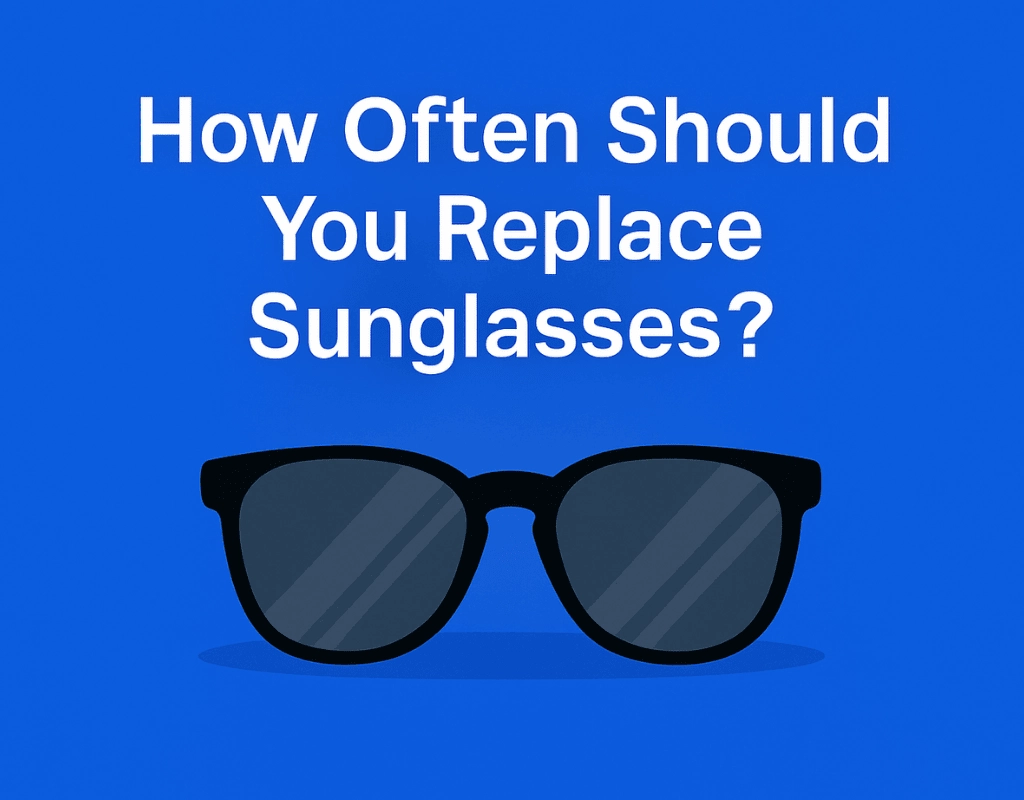Sunglasses are an essential accessory for many, providing both style and vital protection for the eyes. But how long do sunglasses really last? The answer depends on various factors, including their quality, material, and how well they are maintained. This article will explore the key factors affecting the lifespan of sunglasses, how to tell when it’s time to replace them, and the best practices for extending their longevity. By understanding the signs of wear and knowing how to care for them, you can ensure your sunglasses provide you with reliable protection for as long as possible.

1. How Long Do Sunglasses Last?
Sunglasses are designed to last, but their longevity depends heavily on several factors. The first thing to consider is the material of the frame and lenses. Higher-end sunglasses made with durable materials like titanium or acetate can last several years if taken care of properly. On the other hand, cheaper sunglasses made from lower-quality plastic may not hold up as long.
Exposure to the elements also plays a significant role. Sunglasses that are exposed to heat, humidity, and UV rays on a regular basis are more likely to degrade faster. This is especially true for lenses, which can lose their protective coatings or become scratched.
But here’s the kicker: the care and maintenance you put into your sunglasses are what will ultimately determine how long they last. Regular cleaning, proper storage, and avoiding direct sunlight when not in use can all extend their life significantly. In the next section, we’ll explore what specifically affects the durability of your sunglasses.
| Factor | Impact on Lifespan | Example |
|---|---|---|
| Material | High-quality materials like titanium last longer | Titanium frames can last years |
| Exposure to Elements | UV rays and moisture can degrade lenses | Prolonged exposure to sunlight weakens UV protection |
| Maintenance | Proper care extends lifespan | Cleaning regularly and storing in a case preserves lenses |
2. What Affects the Durability of Sunglasses?
The durability of sunglasses can be attributed to several key factors, such as the materials used, exposure to environmental conditions, and how they are stored and cared for. Understanding these factors will help you choose sunglasses that last longer and maintain their performance.
For lenses, the material and coatings play a significant role in how long they will last. Polarized lenses, for example, are not only effective at reducing glare but also tend to last longer than non-polarized lenses. Anti-scratch coatings also improve durability, but even the best coatings wear down over time, especially with frequent cleaning and use.
When it comes to frames, materials like acetate, stainless steel, and titanium are known for their strength and long-lasting properties. Acetate frames, while durable, can become brittle if exposed to extreme temperatures. Plastic frames, although affordable, are more prone to breaking or warping under heat.
You might be wondering: How much does the environment impact my sunglasses? The truth is that regular exposure to high temperatures, saltwater, or humidity can cause both frames and lenses to degrade. Proper storage in a dry, cool place is crucial to extending their life. Let’s take a closer look at how proper maintenance can help keep your sunglasses in top condition.
| Factor | Impact on Durability | Example |
|---|---|---|
| Lens Material | Polarized lenses last longer | Polarized lenses reduce glare and last longer |
| Frame Material | Acetate and titanium are more durable | Titanium frames withstand wear and tear |
| Environmental Exposure | Extreme heat and humidity cause degradation | Storing sunglasses in a cool, dry place prevents damage |
3. How to Know When to Replace Sunglasses
Over time, it becomes necessary to replace your sunglasses, but how do you know when that time has come? The first sign is the condition of the lenses. If they are heavily scratched or discolored, they may no longer offer effective UV protection, which is the primary function of sunglasses. Even if the frame is intact, compromised lenses are a good indicator that it’s time for a replacement.
Another critical sign is if the frames are damaged. If the frame becomes bent or cracked, especially around the hinges, it can affect the fit and comfort of the sunglasses. A poorly fitting pair of sunglasses can cause discomfort or even damage your eyes if they do not provide proper UV protection.
But here’s the kicker: sometimes you may not notice small wear-and-tear issues that could be affecting the lenses. If you use your sunglasses daily, consider getting them checked once a year for UV protection and lens clarity. A professional inspection can reveal problems you might not see, such as lenses losing their UV-blocking ability.
| Issue | Replacement Indication | Action |
|---|---|---|
| Scratches on Lenses | Impaired UV protection | Replace lenses or get a new pair |
| Damaged Frames | Bent or cracked frames | Consider replacing the frames or getting new sunglasses |
| Lost UV Protection | Lenses degrading over time | Get lenses checked or replace sunglasses |
4. Can Sunglasses Last for Years?
Yes, sunglasses can last for years, especially if they are made from high-quality materials and are well-maintained. Many high-end sunglasses brands are known for their durable frames and long-lasting lenses. Premium sunglasses made from materials like titanium, stainless steel, or acetate can stand the test of time when cared for properly.
Manufacturers often recommend a lifespan of about two years for sunglasses, but this is only a general guideline. The actual lifespan can vary based on how often the sunglasses are used, how they are stored, and how well they are maintained. For example, a pair of sunglasses used occasionally and stored in a hard case could last much longer than a pair that’s worn every day and left in the car or exposed to the elements.
What’s the real story? The longevity of sunglasses often comes down to the individual care given to them. With proper attention, your sunglasses can last several years, providing reliable protection and style for a long time.
| Material | Average Lifespan | Care Needed |
|---|---|---|
| Titanium | 5+ years | Regular cleaning, store in a case |
| Acetate | 3-5 years | Avoid heat, store properly |
| Plastic | 1-3 years | Handle carefully, clean regularly |
5. How to Maintain Sunglasses for Longer Life
Maintaining your sunglasses properly is crucial for ensuring they last as long as possible. The first step is regular cleaning. Use a microfiber cloth to gently wipe the lenses, as abrasive materials can scratch them. Always clean both the lenses and the frames to remove dirt, oils, and other debris that can build up over time.
Proper storage is another important aspect of sunglasses maintenance. Always store them in a hard case when not in use. This will protect the lenses from scratches and the frames from bending or breaking. Never leave your sunglasses in a hot car or exposed to direct sunlight for extended periods, as high temperatures can cause the frame and lenses to warp or lose their integrity.
But here’s the kicker: even if your sunglasses are in good condition, it’s essential to avoid extreme conditions, such as saltwater or high humidity, which can cause irreversible damage. By taking a few extra steps to protect your sunglasses, you can significantly extend their life.
| Maintenance Task | Purpose | Recommended Action |
|---|---|---|
| Regular Cleaning | Prevents scratches and residue | Use microfiber cloth to clean lenses |
| Proper Storage | Protects frames and lenses | Store in a hard case |
| Avoid Extreme Conditions | Prevents warping or degradation | Don’t expose sunglasses to saltwater or high humidity |
6. Are Expensive Sunglasses More Durable?
The relationship between price and durability is an important consideration when buying sunglasses. Expensive sunglasses are often made from higher-quality materials, such as titanium, acetate, or stainless steel, which contribute to their longevity. These materials are more resistant to wear and tear compared to cheaper alternatives like plastic or low-grade metals.
Moreover, expensive sunglasses tend to have better lenses, often with advanced coatings like scratch resistance and UV protection that last longer than those found in budget sunglasses. However, the key factor that makes expensive sunglasses more durable is the overall build quality. Premium brands take extra care in designing sunglasses that can withstand daily use, while cheaper sunglasses may not have the same level of attention to detail.
You might be wondering: does this mean that budget sunglasses will always fall apart quickly? Not necessarily. While they may not last as long as high-end sunglasses, some budget-friendly options can provide decent durability if cared for properly. So, it’s essential to weigh your options based on how much you are willing to invest and how you plan to use the sunglasses.
| Sunglasses Price | Durability | Example |
|---|---|---|
| High-End | 3-5+ years | Acetate or titanium frames |
| Budget | 1-3 years | Plastic frames, lower-quality lenses |
7. Do Sunglasses Expire?
Sunglasses do not have a fixed expiration date, but over time, their effectiveness can degrade, especially their UV protection. As lenses are exposed to sunlight, heat, and other environmental factors, the UV-blocking coatings can break down. This is why even a pair of expensive sunglasses may need replacing after a few years, even if the frame looks perfectly fine.
UV protection is one of the most important functions of sunglasses. If the lenses lose their ability to block UV rays, they can actually do more harm than good. So, if you notice that the lenses are no longer as effective or if they become heavily scratched, it’s time to replace them.
| Sign | Action |
|---|---|
| Scratched Lenses | Replace lenses or entire pair |
| Degraded UV Protection | Get a new pair with updated protection |
8. How Do Different Types of Lenses Impact Longevity?
Different types of lenses can affect the longevity of your sunglasses. Polarized lenses, for example, tend to last longer because they are made with stronger materials that resist scratches and degradation. They also provide better protection from glare, making them ideal for outdoor activities.
Scratch-resistant lenses are another popular option for durability. These lenses feature a special coating that prevents surface scratches from forming. However, no lens is completely scratch-proof, so it’s important to still care for them properly.
| Lens Type | Durability | Benefits |
|---|---|---|
| Polarized | 3-5 years | Reduces glare, lasts longer |
| Scratch-Resistant | 2-4 years | Prevents visible scratches |
9. How Does the Climate Affect the Lifespan of Sunglasses?
Your environment can significantly impact how long your sunglasses last. High humidity, saltwater exposure, and extreme temperatures can all cause the frame and lenses to degrade faster. If you live in a coastal area, for example, the salt from the ocean can corrode the frame, especially if it’s made from metal.
To protect your sunglasses, store them in a dry place and avoid leaving them in hot environments, such as the dashboard of your car. If you frequently wear sunglasses while boating or at the beach, consider getting a pair made from corrosion-resistant materials like titanium.
| Climate Factor | Impact on Sunglasses | Recommendation |
|---|---|---|
| Humidity | Causes frame and lens degradation | Store in a dry place |
| Saltwater | Corrodes frames | Rinse with fresh water after exposure |
| Extreme Temperatures | Warps frames, degrades lenses | Avoid leaving in hot environments |
10. What Happens If You Don’t Replace Your Sunglasses?
Worn-out sunglasses can be more than just a fashion statement gone wrong. When the lenses degrade, they may no longer offer the necessary UV protection. Damaged frames can also cause discomfort or fall apart when you least expect it.
If you continue to use sunglasses past their prime, you may be putting your eye health at risk. Damaged or degraded lenses can let harmful UV rays reach your eyes, increasing your risk of cataracts and other eye diseases.
| Issue | Risk of Not Replacing | Action |
|---|---|---|
| Worn-Out Lenses | Decreased UV protection | Replace lenses or entire pair |
| Broken Frames | Discomfort, potential breakage | Get new frames or sunglasses |
11. How Can You Extend the Life of Your Sunglasses?
To extend the life of your sunglasses, make sure to follow some simple maintenance tips. Always clean your lenses with a microfiber cloth and avoid using harsh chemicals. Store your sunglasses in a protective case to prevent scratches and bending. And, most importantly, avoid exposing your sunglasses to extreme conditions like high heat or saltwater.
| Maintenance Task | Purpose | Recommended Action |
|---|---|---|
| Cleaning | Prevents scratches and keeps lenses clear | Use microfiber cloth regularly |
| Storage | Protects from scratches and bending | Always use a case when not in use |
12. What Are the Signs That Your Sunglasses Need Repair?
If your sunglasses are damaged but still have good lenses, repairs may be a viable option. If the frame is bent or broken, you can often get it fixed, depending on the severity of the damage. Professional repair shops can replace broken hinges or fix minor frame damage.
| Damage Type | Repair Options | Action |
|---|---|---|
| Bent Frame | Straightening, hinge repair | Visit a professional repair shop |
| Lens Scratches | Polishing or lens replacement | Replace lenses or use scratch remover |
13. How Often Should You Replace Your Sunglasses Based on Usage?
If you wear sunglasses every day, it’s likely that they will wear out faster. Those who wear sunglasses only occasionally might find that their pair lasts longer. People who use sunglasses for sports or outdoor activities may need to replace them more often due to the increased wear and tear.
| Usage | Replacement Frequency | Action |
|---|---|---|
| Daily Use | 1-2 years | Regularly check for damage |
| Occasional Use | 2-3 years | Monitor for lens degradation |
14. What’s the Average Lifespan of Sunglasses?
The average lifespan of sunglasses can vary depending on the quality of the lenses and frames. High-end sunglasses with quality materials can last up to 5 years or more, while budget options might need replacing within a couple of years. Proper care can make all the difference.
| Quality | Average Lifespan | Care Required |
|---|---|---|
| Premium | 3-5+ years | Regular cleaning and storage |
| Budget | 1-3 years | Handle with care and replace when needed |
15. Conclusion: How to Ensure Your Sunglasses Last Longer
In summary, the lifespan of sunglasses is influenced by the materials, maintenance, and environmental factors. By investing in quality sunglasses, storing them properly, and taking care of them, you can ensure they last for several years. Remember that regular checks for wear and tear, as well as timely replacements, are essential to maintaining optimal protection for your eyes. Whether you’re looking to extend the life of your current pair or considering a new one, proper care is key to ensuring your sunglasses provide reliable UV protection.
| Care Practice | Purpose | Recommended Action |
|---|---|---|
| Regular Checks | Prevents unnoticed damage | Check lenses and frames yearly |
| Proper Storage | Protects from wear and tear | Store in a case when not in use |
FAQ Section
Q1: What factors affect the lifespan of sunglasses?
The lifespan of sunglasses is determined by materials used, exposure to sunlight, moisture, and how well they are maintained. Quality lenses and frames tend to last longer.
Q2: How can I tell when my sunglasses need replacing?
Look for visual signs such as cracks, scratches, or any damage. If the lenses are no longer offering proper UV protection, it’s time to replace them.
Q3: Do expensive sunglasses last longer than cheaper ones?
Generally, expensive sunglasses with high-quality materials and better lenses will last longer. However, proper care can help extend the life of any sunglasses.
Q4: How can I maintain my sunglasses to make them last longer?
Store sunglasses in a case, avoid leaving them in hot or humid environments, and clean them regularly with appropriate tools to extend their lifespan.
Q5: Can sunglasses expire or lose their effectiveness over time?
Yes, sunglasses can lose UV protection over time, especially if they are exposed to excessive heat, light, or improper storage. If you notice deterioration in performance, it’s time for a replacement.

